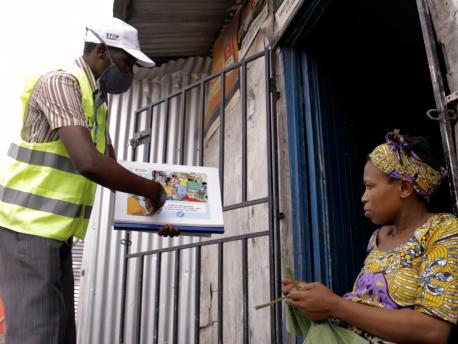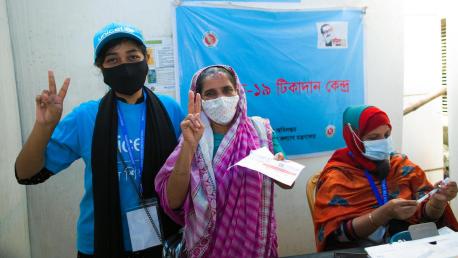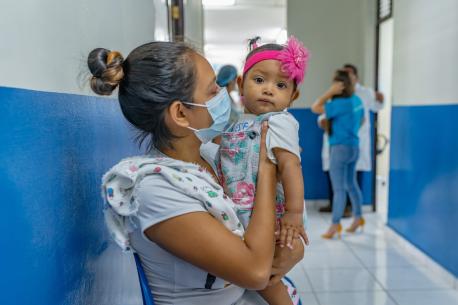
Community Mobilizers Spread the Word on COVID-19 Vaccine Safety in DRC
In a busy marketplace in Goma, North Kivu Province, Democratic Republic of the Congo, curious children crowd around a man wearing a cloth mask and neon yelllow safety vest who's offering a short lesson on how to prevent the spread of COVID-19.
He's one of a team of dedicated community mobilizers supported and trained by UNICEF who take their message to the streets every Friday, raising awareness about the disease. Some of the women on the outskirts of the crowd look skeptical. Past Ebola outbreaks and rumors about vaccines in general have left many wary in this Central African nation — and hungry for information they can trust. "We're very afraid. We don't know what to do," says Riziki Luanda, a Goma resident.
The outreach workers are skilled at combatting vaccine hesitancy, sharing facts about the safety and efficacy of COVID-19 vaccines, earning the community's trust and encouraging those who are eligible to get vaccinated as soon as supplies become available.
Watch UNICEF-trained community outreach workers in action:
"We are the bridge between the [health] structure and the community," says Deogratis M. Mulahuko, president of Goma's community health center. "That's why we are called community relays. They are brothers, they are aunts. This strategy ensures that the population can understand. And by working in the community, the community knows us."
Health safety messaging campaigns are a critical part of UNICEF's lifesaving work to stop the spread of COVID-19. As a key member of ACT-A, the Access to COVID-19 Tools Accelerator — a global health partnership established to respond to the pandemic and ensure that vaccines are distributed equitably worldwide — UNICEF is not only coordinating procurement and delivery of vaccine doses through the COVAX Facility, but also paving the way for a successful rollout by increasing vaccine confidence.
For community mobilizers like Bulonza Rutangira Noella, educating her neighbors about the importance of being vaccinated is more than just a job. It's a way to protect her family and honor the local health workers who came before her. "I have been a community liaison officer here in North Kivu Province for two years now," she says. "My neighbor was a community relay. She has already passed away, but because of all the good that she did for us, I decided to become a community relay too."
Vaccine hesitancy threatens to prolong the pandemic; building trust is imperative
Vaccination rates in high-income countries are 67 times higher than those of low-income countries, and Africa in particular has lagged far behind. Vaccine hesitancy on the continent is one of the factors slowing the region's progress. From January 3, 2020 to September 20, 2021, records show 56,463 confirmed cases of COVID-19 and 1.068 deaths in the DRC. As of September 20, 120,062 vaccine doses have been administered in the country, which has a population of 93 million.
As long as the coronavirus is circulating, the risk remains that more contagious variants may emerge, prolonging the pandemic and potentially altering the effectiveness of the current arsenal of vaccines. "The most important ingredient to any vaccine is trust," UNICEF Executive Director Henrietta Fore wrote in an open letter to the world's children. Vaccine hesitancy goes far beyond COVID-19 vaccines, Fore added, noting that in 2019, the World Health Organization cited vaccine hesitancy as one of the top 10 threats to global health. "Without trust, vaccines are just expensive vials in a doctor’s cabinet."
Your generous gift will support UNICEF's work with partners to pave the way for successful vaccination rollouts around the world and to ensure that COVID-19 vaccines are accessible to all, including the most vulnerable. Please donate today.
Top photo: UNICEF-trained and -supported outreach workers in North Kivu Province, Democratic Republic of the Congo, fight vaccine hesitancy by sharing health information and addressing community concerns. Video by Tong Su for UNICEF USA.
HOW TO HELP
There are many ways to make a difference
War, famine, poverty, natural disasters — threats to the world's children keep coming. But UNICEF won't stop working to keep children healthy and safe.
UNICEF works in over 190 countries and territories — more places than any other children's organization. UNICEF has the world's largest humanitarian warehouse and, when disaster strikes, can get supplies almost anywhere within 72 hours. Constantly innovating, always advocating for a better world for children, UNICEF works to ensure that every child can grow up healthy, educated, protected and respected.
Would you like to help give all children the opportunity to reach their full potential? There are many ways to get involved.




